A wrap-up of the yr’s most vital occasions affecting authorized within the area, and the way they impacted in-house counsel, policymakers, regulators and legislation companies
In phrases of technological evolution, 2024 could possibly be described because the yr of residing dangerously. Synthetic intelligence actually entered the psyche of the authorized sector, for its perceived risks as a lot as its advantages, and together with it got here main considerations on knowledge administration and safety. Satisfactory regulation proved a recurring theme this previous yr as many international locations struggled to maintain up with the sheer tempo of change. Primarily based on insights from senior legal professionals throughout 11 Asian jurisdictions, 2024 has been marked by a conflict between toughened authorized measures and the hovering calls for of innovation.
Lawmakers in Asia have taken focused regulatory steps to sort out longstanding points, in addition to to rein in radical technological transformation. Our analysis reveals that not solely have regulators throughout the area made unprecedented strikes, however corporations and legislation companies have additionally departed from their conventional or decades-long methods.
From Indonesia’s stunning ban on Apple’s iPhone 16 sale on native content material non-compliance grounds, to China’s exodus of US legislation companies, and Nippon Metal’s ground-breaking USD14.1 billion metal buyout, this yr has not been in need of surprises difficult standard knowledge.
With skilled views from senior legal professionals across the area, allow us to stroll you thru the huge upheavals, the largest offers and essentially the most vital regulation which have formed this wonderful yr of change.
Synthetic intelligence
Increasingly more legislation companies in Asia, notably in key regional economies similar to South Korea, have been adopting AI for varied causes, from enhancing administration effectivity to contract critiques to authorized searches prior to now yr.
On the identical time, considerations starting from knowledge safety to ethics over the fast development of AI have intensified, resulting in requires legislative motion to manage the expertise in some Asian international locations.
The South Korean authorities specifically was below mounting stress to carry the tech below regulatory management.
With a backdrop of political uncertainty following then South Korean president Yoon Suk Yeol’s martial legislation declaration and his subsequent impeachment, the Nationwide Meeting handed the Act on the Growth of Synthetic Intelligence and Institution of Belief (AI Fundamental Act) on 26 December. You Jung Lee, managing associate at One Regulation Companions in Seoul, factors to how AI-related challenges have change into “obviously obvious” with the rise of AI-driven deepfake crimes, exposing “profound vulnerabilities” in current authorized constructions within the nation.
“These alarming incidents not solely introduced the AI-related points into sharp public focus, but in addition prompted lawmakers to introduce focused authorized amendments aimed toward enhancing sufferer safety and holding digital platform suppliers extra accountable,” says Lee.
There was an pressing have to enact the AI legislation to reinforce, amongst different issues, knowledge processing protocols and protecting measures for AI programs in South Korea, senior legal professionals within the nation inform Asia Enterprise Regulation Journal.
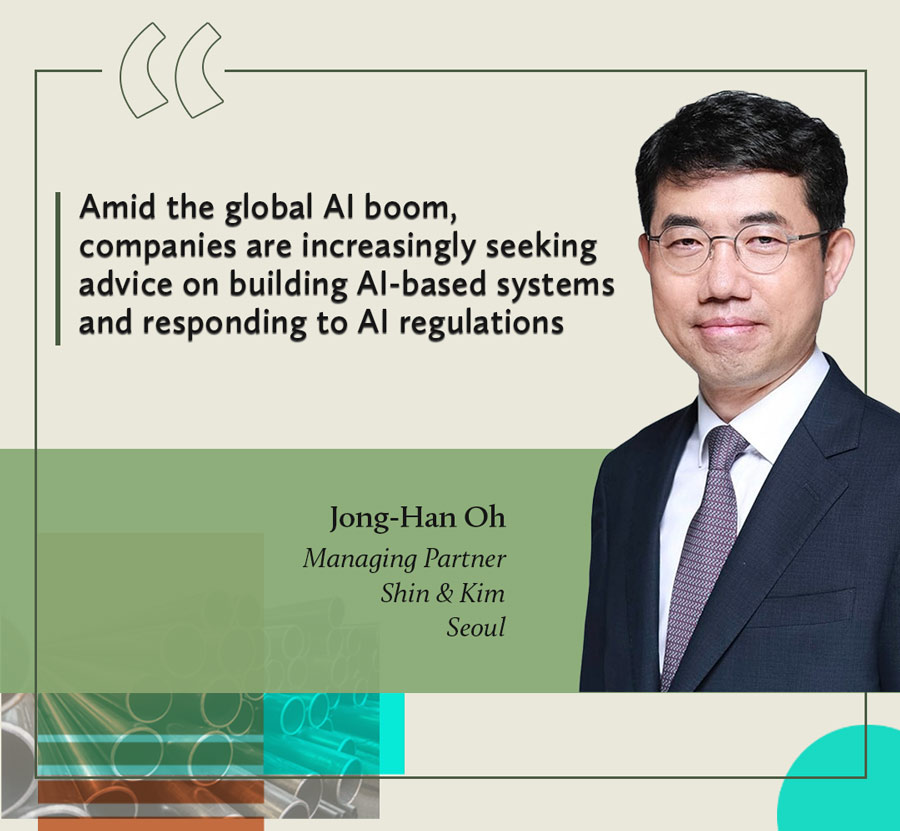

“Amid the worldwide AI growth, corporations are more and more searching for recommendation on constructing AI-based programs and responding to AI laws,” says Jong-Han Oh, managing associate at Shin & Kim in Seoul.
Issues over the dangers of the widening use of AI with out particular authorized frameworks for the expertise usually are not restricted to South Korea. Hong Kong, which at present doesn’t have AI-specific laws, has additionally seen a fast integration of AI into authorized operations amongst legislation companies this yr.


Calling AI an enormous development in 2024 and a “double-edged sword”, Gordon Oldham, senior associate at Oldham Li & Nie in Hong Kong, agrees that the expertise can considerably streamline routine duties, liberating legal professionals to concentrate on advanced and high-level authorized points.
“However I can not sugarcoat it … this technological development comes with actual challenges together with considerations about reliability, knowledge safety and moral concerns, elevating powerful questions on how AI will co-exist with our occupation’s core rules,” says Oldham.
Though Oldham worries about “thorny” points round knowledge safety and the necessity for human oversight as AI adoption accelerates, he factors to how the rise of AI in 2024 catalysed a surge in funding in startups with a concentrate on AI and knowledge switch.
“The demand for authorized experience in drafting and negotiating documentation for establishing and facilitating investments in startup corporations, together with however not restricted to funding agreements and different preliminary set-up documentation, has grown exponentially,” he says.
In Japan, which at present has no overarching authorized framework for regulating AI, the Ministry of Justice’s (MOJ) pointers, revealed in August 2023, decoding the connection between AI authorized expertise and the Japanese Lawyer Act has had a big affect on the additional improvement of AI instruments specialised for authorized use in Japan in 2024, says So Saito, founder and Akasaka Workplace president of So & Sato Regulation Workplaces in Tokyo.
Amid rising collaboration between Japanese legislation companies and authorized expertise service suppliers on AI utilisation for authorized content material, together with M&A templates, the MOJ’s pointers have clarified what, within the provision of AI contract-related enterprise help companies, constitutes unauthorised follow of legislation below the Japanese Lawyer Act.
Saito, a Japan and New York bar-qualified lawyer who specialises in advising on web3, monetary expertise and enterprise finance, says that even earlier than the rules issued in August final yr, legislation companies had already been utilizing authorized expertise software program to search for disadvantageous and lacking clauses when doing typical contract checks. He has heard that purchasers have additionally been utilizing legaltech software program.
“The truth that the availability of AI instruments has been interpreted as not, to a sure extent, constituting a violation of the Japanese Lawyer Act is more likely to result in additional progress within the provision and use of AI past typical contract checks,” says Saito.
The fast integration of AI in Asia’s authorized programs highlights challenges in governance, ethics and regulation. Whereas AI streamlines operations and boosts funding, it additionally raises considerations about safety, reliability and oversight. This duality mirrors broader adjustments in Asia, the place innovation meets rising regulatory calls for. Equally, the worldwide concentrate on atmosphere and social governance (ESG) is reworking company and authorized landscapes, driving accountability, sustainable development and coverage reforms.
ESG
As international urgency round ESG points grows, Asia finds itself on the forefront of this transformative shift. In 2024, key developments throughout the area not solely emphasised the significance of ESG rules but in addition set the stage for an period of heightened accountability, innovation and authorized evolution. Authorized specialists agree that this yr marked a turning level, with vital strides in coverage, finance and company governance.


As Akshay Chudasama, co-managing associate at Shardul Amarchand Mangaldas & Co in Mumbai, factors out, local weather finance has change into a essential driver for ESG adoption in Asia, and the area has witnessed a surge in inexperienced bond issuances.
“Local weather finance in Asia is rising, pushed by the necessity for local weather motion and sustainable improvement. The Asia-Pacific area can be witnessing an elevated concentrate on sustainable finance and ESG concerns,” says Chudasama.
He factors to key traits together with elevated inexperienced bond issuances, a concentrate on local weather resilience, and fintech’s rising position in selling entry to local weather finance for SMEs and low-income households, with the Asia Growth Financial institution taking part in a supportive position within the area.
Chudasama says 2024 was a pivotal yr for local weather jurisprudence in Asia, marked by landmark rulings and a worldwide concentrate on the area’s environmental challenges. In MK Ranjitsinh v Union of India, India’s Supreme Courtroom elevated the “proper to be free from the antagonistic results of local weather change” as basic below articles 14 and 21 of the Indian Structure.
“The 2024 United Nations Local weather Change Convention (COP 29), laid numerous emphasis on Asia, by way of emphasising the necessity for a fast vitality transition, local weather adaptation and resilience, enhanced early warning programs, climate-resilient infrastructure, and climate-smart agriculture,” he says.
Kunal Thakore, joint managing associate at TT&A in Mumbai, echoes this stance, noting: “We’ve got additionally seen a shift within the authorities’s focus in the direction of sustainable improvement and technological integration.”
Nations throughout Asia have taken distinctive approaches to embedding ESG rules into their regulatory frameworks. Within the Philippines, regulatory initiatives like obligatory sustainability reporting and local weather change expenditure tagging mirror the federal government’s proactive stance.
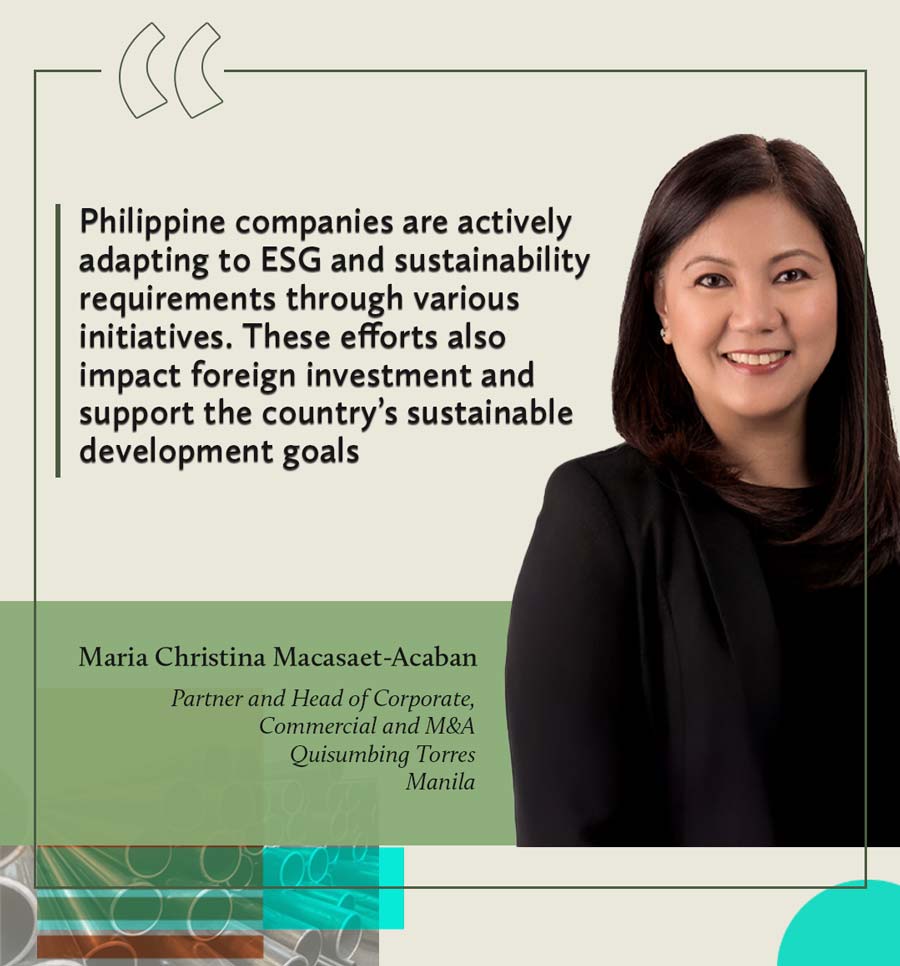

Maria Christina Macasaet-Acaban, associate and head of the company, business and M&A follow group at Quisumbing Torres in Manila, highlights how these measures are shaping company behaviour and attracting overseas funding aligned with the nation’s sustainable improvement objectives.
“Philippine corporations are actively adapting to ESG and sustainability necessities by means of varied initiatives. These efforts additionally affect overseas funding and help the nation’s sustainable improvement objectives,” says Macasaet-Acaban.
In Malaysia, ESG has taken centre stage, with the Securities Fee introducing sturdy pointers for ESG disclosures. Brian Regulation, managing associate at LAW Partnership in Kuala Lumpur, notes that these necessities are pushing companies to combine transparency and accountability into their core operations.
“With elevated international consciousness of ESG points, regulators in a number of Asian international locations, together with Malaysia, are pushing for better accountability and transparency,” says Regulation.
In the meantime, Indonesia is aligning its regulatory efforts with formidable internet zero targets for 2060. The Indonesian authorities inspired and promoted using rooftop solar energy era by companies, governing the set up and operation of personal rooftop photo voltaic panel programs by prospects of public curiosity electrical energy provide enterprise licence holders.
Luky Walalangi, managing associate at Walalangi & Partners in Jakarta, says new laws purpose to draw sustainable funding whereas addressing stakeholder considerations.
“By establishing clear regulatory frameworks, Indonesia seeks to draw each home and worldwide funding in sustainable tasks, enhancing financial development whereas adhering to its environmental obligations,” says Walalangi.
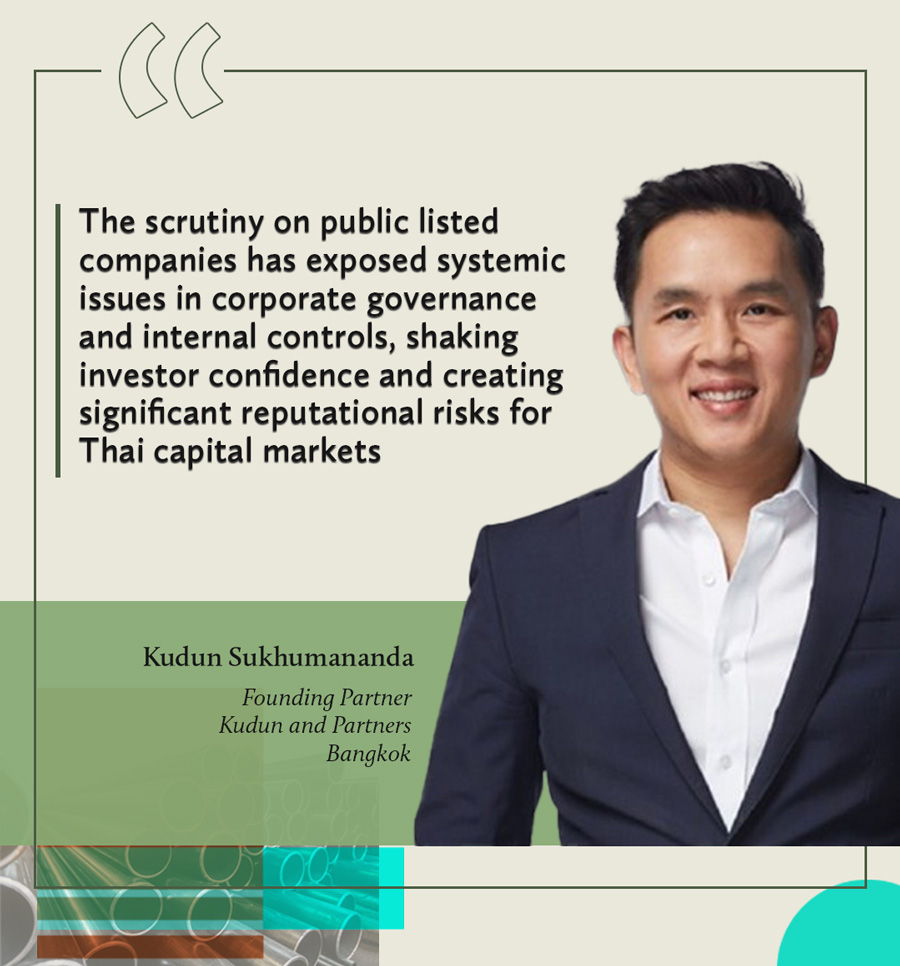

Kudun Sukhumananda, founding associate at Kudun and Companions in Bangkok, highlights how the rising emphasis on ESG compliance has reshaped Thailand’s company methods in 2024. He says companies are below mounting stress to overtake conventional practices, implement complete sustainability frameworks and align with international requirements.
“The scrutiny on public listed corporations has uncovered systemic points in company governance and inside controls, shaking investor confidence and creating vital reputational dangers for Thai capital markets,” says Sukhumananda.
The Clear Air Act, as an example, has launched vital challenges by requiring corporations to undertake stricter environmental controls, together with lowering emissions and enhancing reporting transparency. These calls for necessitate substantial funding and operational changes, compounded by heightened investor expectations for credible ESG commitments, and the authorized dangers related to non-compliance.
“For legislation companies, advising purchasers on navigating untested laws just like the Clear Air Act and managing disputes round environmental legal responsibility are notably demanding,” says Sukhumananda.
With ESG rules redefining company methods and demanding better transparency, the emphasis on governance has change into extra outstanding. This stress on accountability drives regulatory adjustments and empowers stakeholders.
Notably, shareholder activism is rising as traders handle governance points, improve company worth and align with evolving sustainability expectations. Throughout Asia, shareholder engagement is gaining momentum, marking a brand new period the place governance reforms are now not elective however important for long-term success.
Shareholder activism
As lagging inventory costs and subsequent poor returns to shareholders inevitably result in a a lot simpler opening for shareholder activism, managing companions in Japan and Korea inform Asia Enterprise Regulation Journal concerning the surge in shareholder activism of their international locations.
We’ve got been concerned in quite a few activist and defence offers involving unsolicited takeovers, and we anticipate that the quantity of those offers will proceed to extend,” says Ryutaro Nakayama, managing associate at Nishimura & Asahi in Tokyo. “Japanese companies have proven a constructive curiosity in most of these offers as a chance to extend company worth.”
Nakayama says that in Japan, shareholder activism has been on the rise within the type of unsolicited takeover bids after the Ministry of Economic system, Commerce and Trade issued pointers for company takeovers in August final yr.
The brand new pointers have been designed to encourage companies to think about unsolicited takeover bids as potential alternatives to reinforce company worth and to safe shareholders’ pursuits, somewhat than turning them away. “Although many Japanese companies have but to be concerned in such transactions, the rise in most of these offers is outstanding,” says Nakayama.
One prime instance is the acquisition of Takisawa Machine Device by Japanese motor maker Nidec by way of a young provide. In keeping with TMI Associates, which suggested on the deal, Nidec repeatedly referred to the ideas contained within the pointers and efficiently closed its acquisition. This reveals how Japanese corporations at the moment are justifying their unsolicited takeovers in a rustic the place “hostile” takeovers have lengthy been taboo.
Consequently, the rise in unsolicited takeover bids is encouraging shareholders and fairness traders to change into extra vocal, and is making a extra clear, aggressive and dynamic atmosphere to maximise company worth.
Alternatively, in South Korea, shareholder activists have been demanding the modification of the Industrial Act with a purpose to repair a scenario the place the opinions of minority shareholders are excluded within the decision-making course of for essential firm issues.
South Korea’s most important opposition Democratic Celebration, led by Lee Jae-myung, has been pushing for passage of the Industrial Act modification invoice within the Nationwide Meeting all year long.
“Many imagine that amendments to the Industrial Act are needed to reinforce company worth by means of value-up initiatives by bettering South Korea’s outdated governance construction,” says Dong Hoon Lee, managing associate at Barun Regulation in Seoul.
Nonetheless, with the impeachment of President Yoon Suk-yeol within the highlight following the latest declaration of martial legislation, it’s extensively believed that any modification invoice is not going to be handed this yr.
Jong-Han Oh, managing associate at Shin & Kim in Seoul, says that activist shareholders have been a driving drive within the improve of administration disputes within the nation. “Shareholder disputes, or shareholder activism, associated to company governance have gotten extra energetic within the Korean capital markets, resulting in a big improve in administration disputes and associated advisory companies,” says Oh.
A notable instance of this was when MBK Companions, a Seoul-based main non-public fairness agency in Asia, lately partnered with Younger Poong, the biggest shareholder of Korea Zinc, to name for enchancment of the governance construction at Korea Zinc. They claimed that Korea Zinc chairman Yun B Choi’s arbitrary administration was alleged to have broken the shareholder worth, with Shin & Kim being the authorized adviser for Younger Poong.
Whereas shareholder activism advocates for improved transparency, truthful illustration and accountability inside companies, an identical name for oversight is surfacing within the digital realm. The rise of data-driven applied sciences has positioned knowledge safety and privateness on the head of regulatory considerations throughout Asia.
Governments are starting to reply to these challenges with stricter knowledge safety legal guidelines aimed toward securing delicate info and sustaining public belief. Simply as shareholders push for higher company governance to guard worth, regulators are shifting to make sure sturdy knowledge governance to safeguard the evolving digital financial system.
Information safety
As digital transformation accelerates within the Asia-Pacific, knowledge sovereignty and digital governance have change into urgent considerations. Managing companions throughout the area word how the governments in Asia are more and more centered on enhancing knowledge safety legal guidelines, and the way this brings each challenges and alternatives for corporations and legislation companies.
“The APAC area is witnessing a surge in knowledge localisation legal guidelines, with international locations like India, China and Indonesia implementing laws to safeguard delicate info,” says Chudasama, at Shardul Amarchand Mangaldas & Co. These legal guidelines purpose to supervise the processing of the non-public knowledge of people to make sure that knowledge isn’t misused or misapplied.
In July, Malaysia’s parliament handed the Private Information Safety Modification Invoice 2024, introducing main updates to the Private Information Safety Act (PDPA), which was enacted in 2010. The amendments strengthen penalties for private knowledge breaches by rising the high quality from MYR300,000 (USD67,000) to MYR1 million, and the utmost imprisonment from two years to a few years.
“Malaysia’s PDPA has seen tightening enforcement and penalties,” says Regulation, at LAW Partnership. “Moreover, the rise in cybersecurity incidents has led to extra stringent laws on knowledge breaches and safety of delicate info.”
Melisa Uremovic and Supawat Srirungruang, co-managing companions at Rajah & Tann Thailand in Bangkok, say Thailand’s PDPA noticed stricter enforcement this yr, with the Workplace of the Private Information Safety Committee issuing the primary administrative high quality for non-compliance with the PDPA in July.
The federal government is requiring corporations to revamp their knowledge governance methods and handle cybersecurity considerations, going through vital authorized publicity in the event that they fail to conform.
“The stricter enforcement of information privateness laws has additionally elevated the complexity of compliance for a lot of corporations, notably those who lack the interior sources or experience to navigate these necessities,” say Uremovic and Srirungruang.
Regulatory upgrades have been impacting not solely corporations’ operations in Asian markets, but in addition compliance prices and market entry methods. In Vietnam, the federal government issued the primary draft of the Private Information Safety Decree (PDPD) in September, tentatively set to take impact on 1 January 2026.
The PDPD outlines key compliance obligations for companies concerned in processing private knowledge in Vietnam; failure to stick to the laws outlined within the PDPD will end in repercussions together with administrative fines or prosecution.
“The brand new knowledge laws, which introduces stricter controls on knowledge dealing with and cross-border transfers, marks a big step towards international compliance however presents a studying curve for companies,” says Tran Duy Canh, managing associate at Dentons LuatViet in Ho Chi Minh Metropolis.
In Australia, the parliament handed a world-first invoice with a social media ban for youngsters below 16 in November, which may see tech giants fined as much as AUD50 million (USD32.5 million) in the event that they fail to forestall under-age customers from accessing social media companies. A lot of specialists raised their considerations with the invoice, together with the potential privateness dangers of overcollection of non-public info essential to confirm a person’s age.
“Privateness is a key danger raised by the age restriction obligation given the potential for platforms to gather and maintain private, together with delicate, details about weak teams,” says Veronica Scott, a associate at Pinsent Masons in Melbourne.
The legal professionals Asia Enterprise Regulation Journal interviewed say that regulatory developments within the area usually are not solely bringing challenges, but in addition new alternatives for legislation companies.
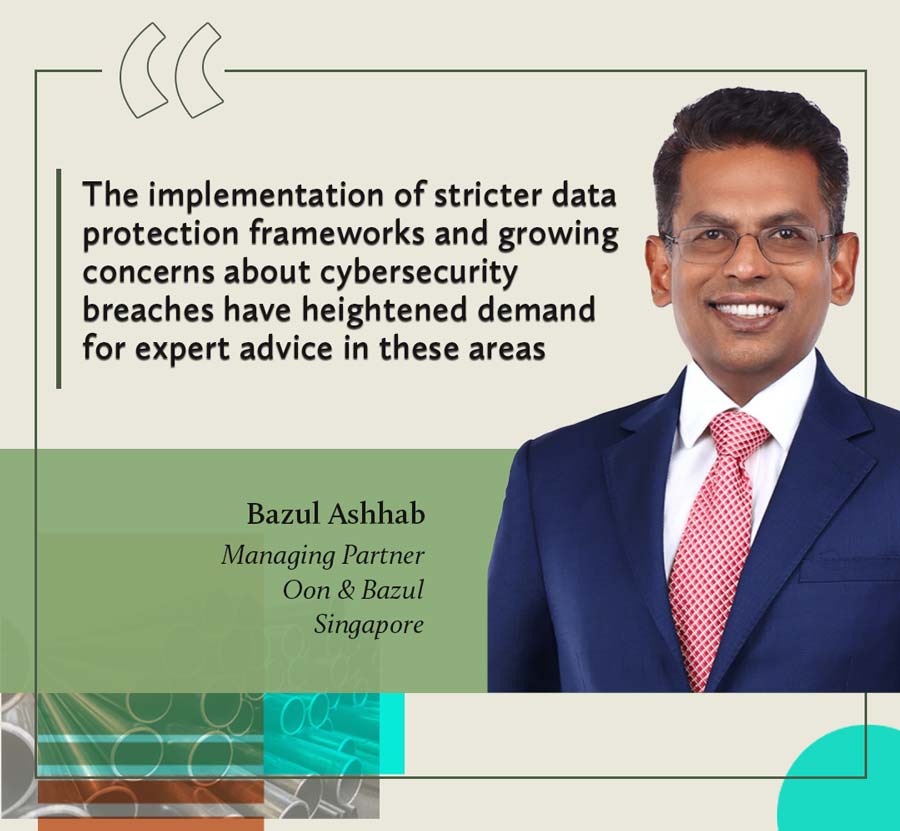

“I imagine these occasions are a minefield of alternatives, somewhat than challenges,” says Bazul Ashhab, managing associate at Oon & Bazul in Singapore.
“The implementation of stricter knowledge safety frameworks and rising considerations about cybersecurity breaches have heightened demand for skilled recommendation in these areas,” he says.
Jong-Han Oh, managing associate at Shin & Kim in Korea, agrees with Ashhab. “As home and worldwide laws have change into more and more strict and complicated, corporations have gotten extra focused on compliance,” says Oh.
“Private info/info safety, which is turning into more and more essential as a consequence of digital and AI transformation, is anticipated to change into a subject that draws consideration by way of compliance.”
As corporations throughout Asia adapt to stricter knowledge governance necessities, deal-making actions stay sturdy. This momentum is pushed by methods for development, market growth and innovation. From acquisitions to transactions, companies are navigating advanced regulatory frameworks whereas pursuing alternatives that reshape industries throughout the area.
Deal highlights
Japan has been a frontrunner driving cross-border deal exercise in Asia, having began 2024 off with Nippon Metal asserting its USD14.1 billion proposed takeover of US Metal Company, and ending the yr with Nippon Life Insurance coverage making an USD8.2 billion provide for US life insurer Decision Life Group Holdings.
As a consequence of a saturated home market, Japanese corporations have been ramping up abroad funding prior to now yr, after an outbound M&A hunch within the aftermath of the covid pandemic.
In keeping with knowledge revealed on 18 November 2024 by Hong Kong-based non-public capital advisory and fund placement platform Finex Hong Kong, Japan’s outbound M&A quantity surged by 36% to just about USD45 billion in 2024. Exemplifying the rise in Japan’s abroad funding, Finex pointed to USD76 billion spent by Japanese corporations in launching greater than 5,430 tasks throughout Vietnam as of September 2024.
The need for additional company development has led not solely to abroad acquisitions value billions of {dollars} – similar to Japanese homebuilder Sekisui Home’s USD4.9 billion buyout of Denver-based trade peer MDC Holdings at first of 2024 – but in addition record-breaking offers for various industries. Nippon Life’s latest USD8.2 billion provide to amass US counterpart Decision Life made the proposed takeover the biggest abroad buyout by a Japanese insurer so far.
Whereas Japanese corporations have been making record-breaking investments outdoors Asia, we’ve got seen benchmark-setting transactions within the Philippines prior to now yr that have been “first of a form” for the industries during which they befell.
Hailed by senior legal professionals within the nation as a “sport changer”, the creation of one of many Philippines’ largest impartial telecommunications tower corporations following a mixture between Phil-Tower Consortium and Miescor Infrastructure Growth Company was the primary such deal within the nation’s impartial tower market.
The brand new entity, which is owned by a consortium of worldwide and native traders together with Macquarie, Stonepeak, Manila Electrical Firm and World Community, boasts a portfolio of greater than 3,300 operational towers throughout the Philippines.
Mark S Gorriceta, the managing associate and head of the company, banking and finance and TMT teams of Gorriceta Africa Cauton & Saavedra in Metro Manila, advised Asia Enterprise Regulation Journal that the Philippine Competitors Fee’s approval of the Phil-Tower-MIDC mixture highlighted the regulatory endorsement of the sharing of passive or non-electronic telecoms infrastructure similar to towers.
As considered one of Southeast Asia’s fast-growing economies, Vietnam has hosted the institution of the nation’s first LNG-to-power vegetation this yr, introducing 1.6GW to the nationwide grid and serving to to cut back Vietnam’s coal dependency according to the federal government’s Energy Growth Plan.
Six companies – Norton Rose Fulbright, VILAF, YKVN, Kim & Chang, Bär & Karrer and Pinsent Masons – suggested on the USD521.5 million financing of PetroVietnam Energy Company’s (PV Energy) Nhon Trach 3 and 4 LNG-to-power tasks.
Truong Nhat Quang, YKVN’s managing associate and lead on the deal, says these have been the primary large-scale LNG tasks in Vietnam to be financed with no authorities assure, establishing a vital precedent for future tasks.
India, which has been operating a sturdy fairness capital market throughout a normal downturn in IPOs throughout Asia below a excessive rate of interest atmosphere, additionally lately made worldwide headlines for internet hosting the biggest IPO in India, in late October.
Hyundai Motor India’s landmark USD3.3 billion IPO, which was the South Korean carmaker’s first itemizing of a unit outdoors the nation, was additionally the second-largest globally in 2024 so far.
The general public float, which noticed the itemizing of fairness shares on the Bombay Inventory Alternate and the Nationwide Inventory Alternate of India, introduced collectively a world lineup of authorized advisers together with Latham & Watkins, White & Case, Shardul Amarchand Mangaldas & Co, and Cyril Amarchand Mangaldas.
Hong Kong, which for the primary half of the yr had grappled with an IPO hunch amid a post-covid financial downturn, witnessed the biggest debut on the town’s bourse prior to now three years.
Suggested by Skadden, Jia Yuan Regulation Workplaces, Shihui Companions, Freshfields Bruckhaus Deringer, and King & Wooden Mallesons, China house equipment large Midea Group raised greater than HKD31 billion (USD3.98 billion) in its maiden public itemizing. The Hong Kong Inventory Alternate (HKEX) filings confirmed that 18 cornerstone traders, together with COSCO Transport Holdings, UBS AM Singapore and BYD, had collectively dedicated practically USD1.26 billion.
With corporations chasing alternatives for development and funding, legislation companies adapt to altering market dynamics, geopolitical pressures and consumer demand. These elements have pushed legislation agency actions, from exits and downsizing in Larger China to expansions into rising hubs like Singapore and international markets past Asia.
Regulation agency actions
2024 was a yr marked, amongst different issues, by a wave of worldwide legislation companies, notably from the US, exiting from and downsizing their operations in Larger China amid ongoing geopolitical tensions and post-covid financial uncertainty on the planet’s second-largest financial system.
Throughout the first week of December, Paul Weiss and Milbank, confirmed their respective plans to drag out of mainland China with scheduled Beijing workplace closures, becoming a member of not less than 10 overseas legislation companies that had introduced the closure of their workplaces within the financial powerhouse prior to now yr.
Out of the ten overseas legislation companies, all however one – Eversheds Sutherland from the UK – have been US legislation companies, together with Paul Weiss, one of many first internationals to have launched in mainland China with a Beijing workplace again in 1981.
However a number of UK and Asian legislation companies have come to determine alternatives in Larger China, taking part in a key half in driving a reverse of the US development in 2024. In its newest Asia growth, London-based DAC Beachcroft opened an workplace in Hong Kong in September, marking the UK agency’s second outfit within the area after its Singapore department established in 2011.
In an interview with Asia Enterprise Regulation Journal, associate Ross Risby, who launched the brand new Hong Kong workplace with associate Wai Yue Loh, stated that his agency would concentrate on insurance coverage, transport, buying and selling and commodities work within the metropolis, serving purchasers together with main worldwide insurers similar to Zurich Insurance coverage Group and Allianz.
Rajah & Tann, considered one of Singapore’s 4 largest legislation companies, additionally introduced in July the setup of an workplace in Qianhai, Shenzhen, scheduled for launch within the fourth quarter of this yr. Patrick Ang, the agency’s managing associate, pointed to the rising commerce and funding between China and Southeast Asia as a key issue for the institution of the brand new workplace to satisfy the ensuing consumer wants. He additionally added that the agency’s strengths in dispute decision aligned with Qianhai’s goal of turning into a world arbitration centre.
Whereas Singaporean legislation companies have been eyeing alternatives in China to additional their regional growth, Singapore itself has continued to draw overseas legislation companies from the US and Europe, in addition to Asia, to arrange store and benefit from the city-state’s developed monetary and authorized infrastructure, with a rising worldwide arbitration scene.
Seladore Authorized, a London-based disputes-only legislation agency, introduced in early November its imminent plan to use for a overseas legislation follow licence for its department launch within the Lion Metropolis, which might be the agency’s first outfit in Asia and out of doors Europe. The UK agency had additionally employed Singaporean worldwide arbitration lawyer Liang-Ying Tan as a associate for the deliberate Singapore workplace launch.
However, for a lot of Asia-based companies, notably these in Japan and mainland China, Singapore and different main regional cities and markets have already lengthy been explored. For them, additional worldwide growth has meant venturing out of the area into Europe and North America.
Up to now yr, 4 out of the 5 largest Japanese legislation companies – Nishimura & Asahi, Mori Hamada & Matsumoto, TMI Associates, and Nagashima Ohno & Tsunematsu – have expanded their international operations outdoors Asia.
Mori Hamada introduced in early December its deliberate launch of a San Franscisco Bay Space workplace, its second base within the US after the New York department, getting down to present an Asia follow to purchasers primarily based on the West Coast to faucet expertise and startup-related authorized wants.
Nagashima Ohno, alternatively, made an introduced transfer in early November to launch a London workplace with the purpose to construct a pipeline of vitality and environment-related work in Europe as Japanese corporations stay energetic in these areas. Regulation companies adapt to ever-changing market calls for and develop into new territories, whereas governments throughout Asia introduce regulatory reforms to deal with new challenges and alternatives. These adjustments – starting from native content material necessities to cybersecurity laws and capital market oversight – assist redefine the authorized and enterprise panorama. Consequently, new compliance pressures come up. Nonetheless, additionally they provide development prospects for companies and companies alike.
Rules
In a transfer that captured international consideration, Indonesia enforced its native content material requirement (TKDN) coverage, prohibiting Apple from promoting its flagship iPhone 16 as a consequence of non-compliance with the 40% native content material mandate. Because the fourth-largest smartphone market globally, Indonesia’s regulatory framework commits to strengthening home industries by selling technological functionality and supporting native suppliers.
Apple’s preliminary USD100 million funding proposal fell brief, prompting the tech large to rethink its technique. By year-end, Indonesia’s funding minister had introduced that Apple had dedicated to a USD1 billion funding, a big shift that features the institution of a full-scale manufacturing plant in Indonesia. This improvement marks a turning level in how international corporations align with native insurance policies to keep up market presence.
On a distinct word, the cybersecurity panorama noticed pivotal regulatory shifts in 2024, with Malaysia, Singapore and Australia introducing landmark laws to deal with rising threats.
Malaysia’s Cyber Safety Act 2024, efficient from 26 August, launched stringent measures for nationwide essential info infrastructure (NCII), together with obligatory danger assessments, incident reporting and a licensing regime for cybersecurity service suppliers. Non-compliance carries extreme penalties, together with hefty fines and imprisonment, underscoring Malaysia’s dedication to fortifying its digital infrastructure.
In Singapore, amendments to the Cybersecurity Act 2018 by means of the Cybersecurity Invoice addressed evolving dangers and trade practices, broadening regulatory protection and impacting stakeholders. The amendments handle latest technological developments and adjustments in trade practices. The protection addresses evolving cybersecurity dangers and represents a well timed replace to the cybersecurity regulatory framework in Singapore.
In the meantime, Australia enacted its first standalone Cyber Safety Act, introducing obligations similar to ransomware cost reporting and enhanced incident response protocols, setting a brand new commonplace for cybersecurity governance.
Vietnam, too, embraced authorized reforms by overhauling its land legislation framework. Land Regulation 2024 was authorised on 18 January and took impact on 1 August, marking a big overhaul of its land regulatory framework. Set to switch the 2013 legislation, the up to date laws goals to foster transparency and stimulate actual property market development.
Key adjustments embody refined land rental cost provisions, expanded rights for customers below land rental exemptions and a extra clear expropriation course of. Traders are given restricted leeway to suggest land acquisition strategies, reflecting the federal government’s concentrate on balancing improvement with regulatory integrity.
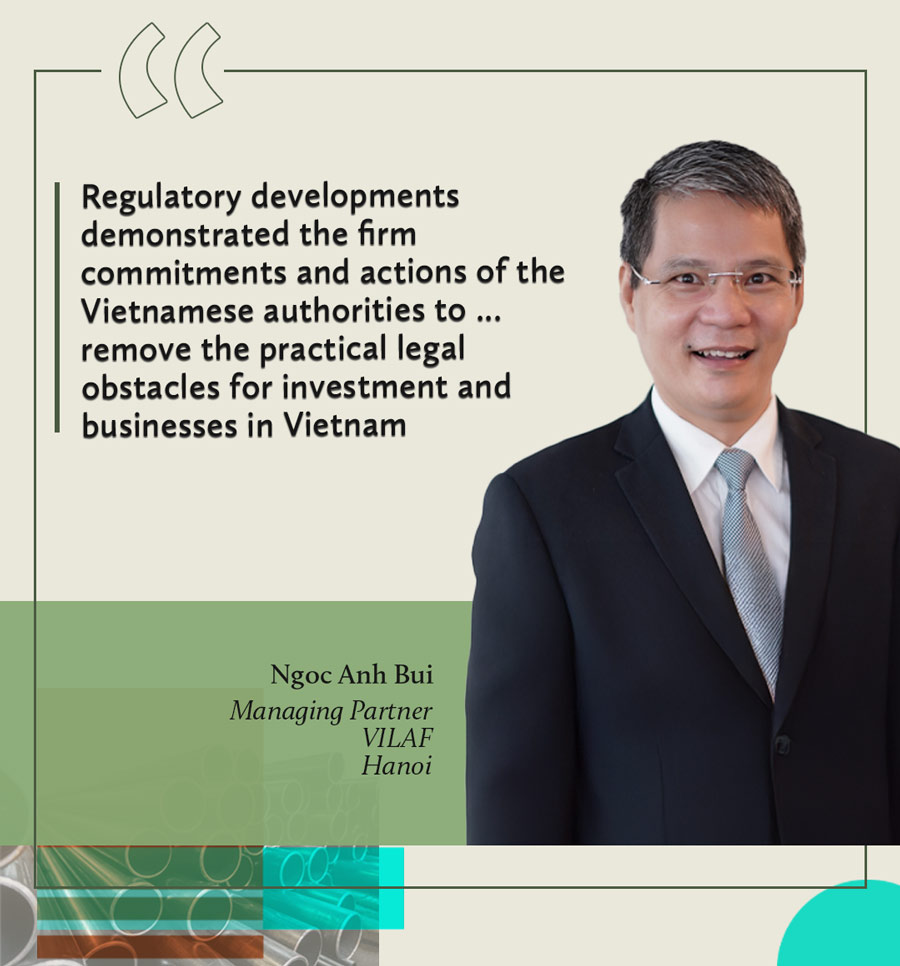

“These regulatory developments demonstrated the agency commitments and actions of the Vietnamese authorities to undertake the true actions to sort out and take away the sensible authorized obstacles for funding and companies in Vietnam,” says Ngoc Anh Bui, managing associate of VILAF’s Hanoi workplace.
In China, the revised Measures for the Administration of the Provision of Securities Authorized Providers by Regulation Corporations, applied in late 2023, noticed its full affect unfold in 2024. These measures expanded the supervision of securities authorized practices, now together with abroad choices and listings by home corporations.


“For legal professionals whose most important space of follow is securities, the revision and the official implementation of (the measures) has been essentially the most difficult improvement,” says Jian Hai Luan, a associate at Commerce & Finance Regulation Workplaces in Beijing.
The measures have been revised and promulgated in October 2023 and applied on 1 December 2023, however their affect on the securities legislation trade was not actually mirrored till 2024, Luan advised Asia Enterprise Regulation Journal.
“Regulation companies confronted elevated scrutiny by means of periodic reporting necessities, on-site inspections and stricter compliance mandates. The heightened regulatory stress posed vital challenges, notably for companies managing cross-border securities practices,” says Luan.
The second half of 2024 noticed a resurgence in Hong Kong’s IPO market, pushed by stricter vetting processes for A-share listings in mainland China. This tightening redirected many Chinese language corporations to hunt listings in Hong Kong, bolstering its capital markets exercise.
Moreover, the reintroduction of Hong Kong’s unique itemizing procedures inspired exercise on the GEM (Development Enterprise Market) board and revived curiosity in transitioning to the HKEX most important board. These adjustments spotlight the evolving interaction between mainland and Hong Kong capital markets, with Hong Kong reclaiming its standing as a most popular vacation spot for IPOs.
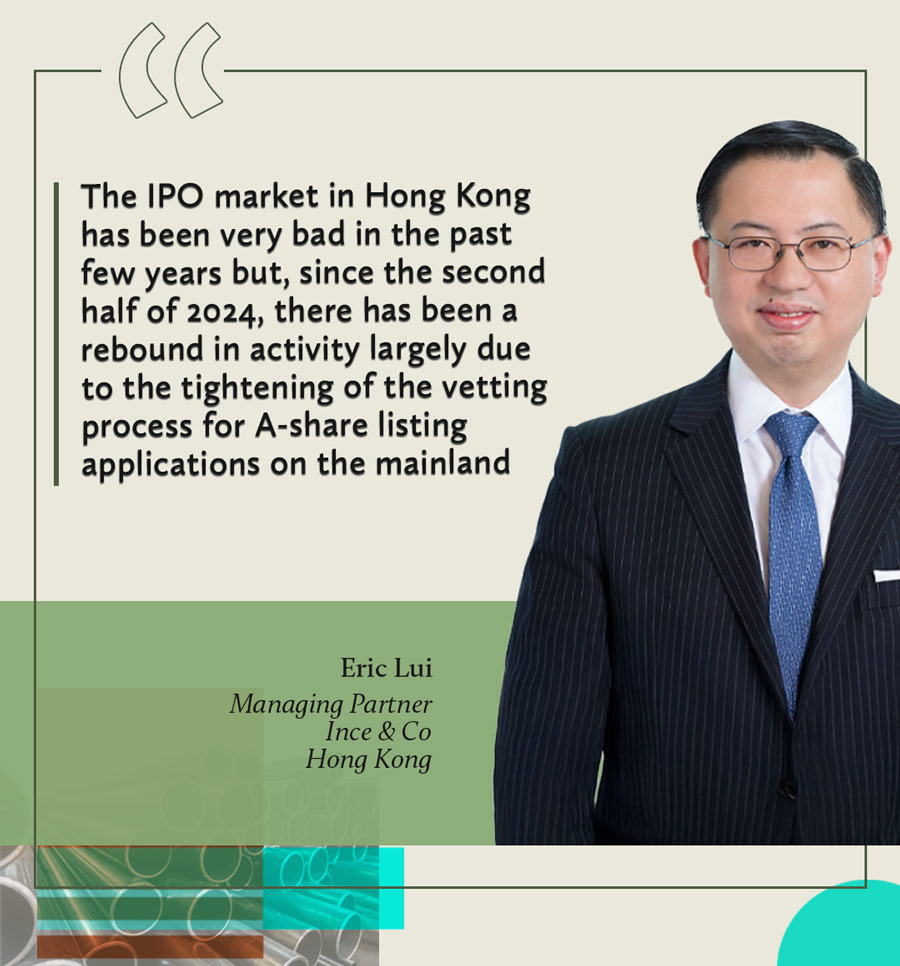

“The IPO market in Hong Kong has been very dangerous prior to now few years, however, because the second half of 2024, there was a rebound in exercise largely as a result of tightening of the vetting course of for A-share itemizing purposes on the mainland,” says Eric Lui, managing associate at Ince & Co in Hong Kong.
==================================================
AI GLOBAL INSURANCE UPDATES AND INFORMATION
AIGLOBALINSURANCE.COM
SUBSCRIBE FOR UPDATES!